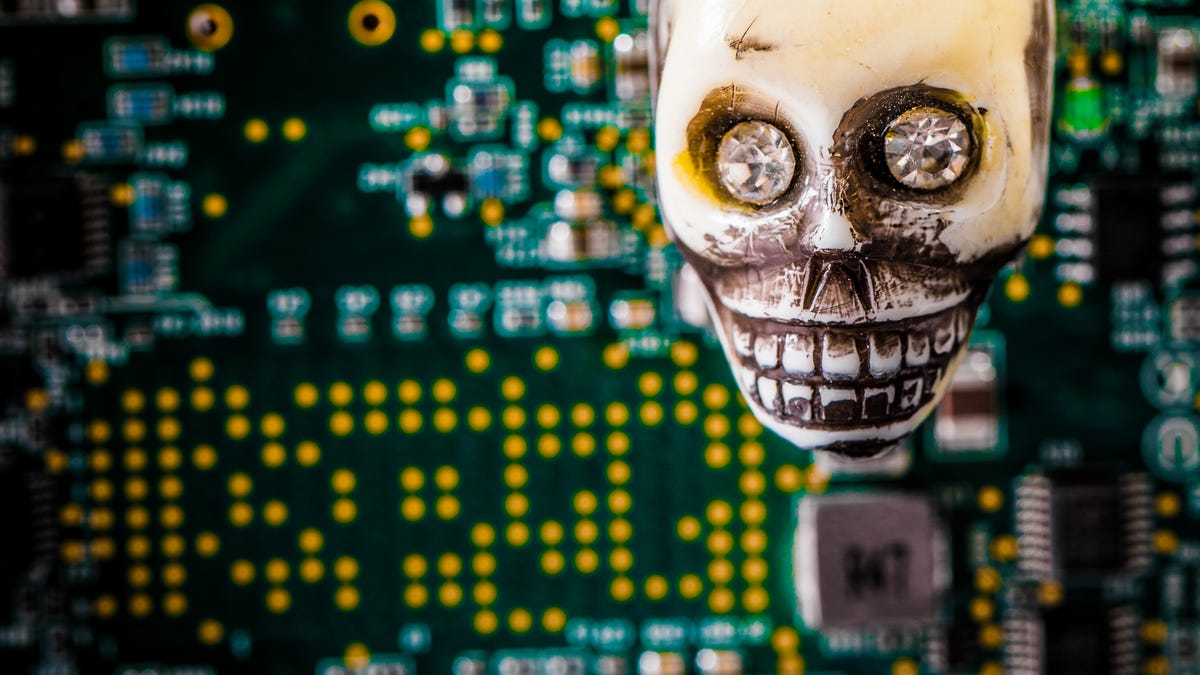Hackers, trolls and other tech nightmares of 2017
With so many scares and frights in the tech industry this year, it was hard to tell the difference between real life and B-movie horror flicks.
I'm already quaking in my boots and I haven't even started writing this story yet.
Remember last year, when Samsung Galaxy Note 7 devices were blowing up in people's pockets, on nightstands and even on a commercial airplane?
That seemed like a tech nightmare for the ages. Turns out that was nothing compared to what's happened in 2017 -- so far.
No, the terminators haven't come for us yet, though Saudi Arabia did just grant citizenship to a robot named Sophia that literally said it would kill human beings. But it still feels like we're in some weird alternate dimension filled with a steady stream of shocking revelations, from massive government hacking programs to troll armies ruining people's lives to the Russian government using Facebook and Twitter to interfere in last year's presidential election.
Don't bother pinching yourself. It's all real. Here's a quick recap of the year's most gruesome tech tales.
Nonstop hacking
You'd think mega-corporations with everything to lose from a massive hack would do anything they could to prevent attacks. Think again.
Equifax, the data collection company that has your financial information whether you want it to or not, announced in September that more than 140 million people's information had been compromised. That includes names, addresses, Social Security numbers, bank info and so on.
Worse, it turned out that Equifax knew about the hack for weeks before telling us. And when it did, the company set up a terrible website, filled with security problems like poor passwords. And, ultimately, the site itself was also hacked.
If you think these were well-meaning mistakes and not selfish blundering, keep in mind that two high-level Equifax executives sold stock just before the announcement.
It's no wonder Equifax CEO Richard Smith suddenly retired. But don't worry, he made out with a pay package worth as much as $90 million.
Yahoo, already synonymous with embarrassing cybersecurity failures after revelations in 2016 that the accounts of 1 billion users had been compromised, saw Equifax's screw-up and said: We can top that.
Yahoo's new owner, Verizon, admitted earlier this month that the attack was even worse than we thought. It turns out every single one of the 3 billion accounts in Yahoo's system had been compromised. All of them.
That cackling you hear? That's former CEO Marissa Mayer, who still got her golden parachute worth more than $23 million.
Oh, and if that's not enough to keep you up at night, we learned from a cache of documents leaked from the Central Intelligence Agency that, among other things, the government could be using our TVs to spy on us. That's right out of the plot of George Orwell's dystopian classic, "1984."
Trolls taking over
Internet trolls have been having one of their best years, and politicians have finally taken notice.
Congress is summoning Google, Twitter and Facebook to Capitol Hill to talk about how their online services were used by the Russian government to interfere in the US presidential election. The meetup is starting on Halloween and continues Wednesday. Do you have your Thriller popcorn yet?
The specter of Russian interference in the 2016 presidential election has forced the once-high flying tech industry back to Earth. Facebook CEO Mark Zuckerberg has faced repeated questions after he initially dismissed concerns about Russian meddling. Twitter, meanwhile, last week began banning ads from Russian-linked sites.
Did we all dance a collective time warp back to the days of the cold war?
Unfortunately, Russia isn't the tech industry's only problem.
Nonstop vicious and all-encompassing online harassment was another theme this year, due in some part to the troll armies that supported Donald Trump during his rise to the presidency. Twitter has declined to have its CEO, Jack Dorsey, answer even basic questions to reporters about the service's handling of harassment among its 330 million tweeters, leading to additional pressure for the company to meaningfully change its policies.
Fake news
What, you thought we were done talking about trolls?
Maybe the most depressing part of 2017 was how much of it we spent debating what facts even are. With some people calling real stories fake and fake conspiracies real, the tech industry has been under increasing pressure to solve the problem.
And right, these companies should. After nearly a year of nonstop drumbeat debate and promises to better weed out hoax stories, the computer programs that highlight "news" on Facebook, Twitter and Google failed during the October shootings in Las Vegas. Trolls published tweets purporting to be the shooter or missing persons even as hoax stories and irresponsibly reported pieces that misidentified the shooter were prominently displayed on Google and Facebook.
So far, Facebook and a few others have promised changes, like beefing up the teams of people who monitor bad behavior on their services. They've also vowed to more carefully monitor ads so they don't give a platform to misleading info.
It's all enough to keep me quaking in my boots until 2018.
It can't get any worse. Right??
iHate: CNET looks at how intolerance is taking over the internet.
CNET Magazine: Check out a sample of the stories in CNET's newsstand edition.


